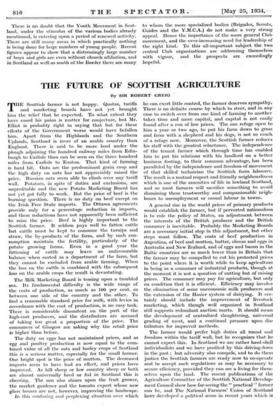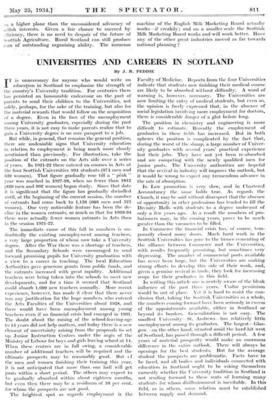THE FUTURE OF SCOTTISH AGRICULTURE
By SIR ROBERT GREIG
THE Scottish farmer is not happy. Quotas, tariffs and marketing boards have not yet brought him the relief that he expected. To what extent they have eased his pains is matter for conjecture, but Mr. Elliot is probably right in saying that but for these efforts of the Government worse would have befallen him. Apart from the Highlands and the Southern Uplands, Scotland is more of an arable country than England. There is said to be more land under the plough adjoining the .hundred railway miles from Edin- burgh to Carlisle than can be seen on the three hundred miles from Carlisle to Euston. That kind of farming is hard hit. Oats arc the predominant grain crop and the high duty on oats has not appreciably raised the price. Russian oats seem able to climb over any tariff wall. Potatoes, in spite of duties and exclusions, are unprofitable and the new Potato Marketing Board has not yet got fully to work. But the price of beef is the burning question. There is no duty on beef except on the Irish Free State imports. The Ottawa agreements provide only for a percentage reduction in imports, and these reductions have not apparently been sufficient to raise the price. Beef is highly important to the Scottish farmer. It seldom pays well to fatten cattle but cattle must be kept to consume the turnips and straw, the by-products of the farm, and by such con- sumption maintain the fertility, particularly of the potato growing farms. Even in a good year the fattening of cattle may leave an unfavourable balance when costed as a department of the farm, but they cannot be excluded from arable farming. When the loss on the cattle is combined with the subsequent loss on the arable crops the result is devastating.
The Milk Marketing. Board is tossing upon a troubled sea. Its fundamental difficulty is the wide range of the costs of production, as much as 100 per cent. as between one side of the country and the other. To find a reasonable standard price for milk, with levies in accordance with the cost of production, is no easy task. There is considerable discontent on the part of the high-cost producers, and the distributors are accused of taking too great a proportion of the price. The consumers of Glasgow are asking why the retail price is higher than before.
The duty on eggs has not maintained prices, and as egg and poultry production is now equal to the com- bined value of all the oats and barley crops of Scotland this is a serious matter, especially for the small farmer. One bright spot is the price of mutton. The decreased imports seem to have had an effect, and prices have improved. As hill sheep or low country sheep or both are almost universally bred or fed in Scotland this is cheering. The sun also shines upon the fruit grower, the market gardener and the tomato expert whose new glass houses are not, however, .improving the landscape.
In this confusing and perplexing situation over which he can exert little control, the farmer deserves sympathy. There is no definite course by which to steer, and in any case to switch over from one kind of farming to another takes time and more capital, and capital is not easily found after a run of low prices. The one refuge open to him a year or two ago, to put his farm down to grass and farm with a shepherd and his dogs, is not so much of a refuge now. Moreover, the Scottish farmer reduces his staff with the greatest reluctance. The independence of the tenant farmer which through time has enabled him to put his relations with his landlord on a better business footing, to their common advantage, has been paralleled by the independence and freedom of movement of that skilled technician the Scottish farm labourer. The result is a mutual respect and friendly neighbourliness which is one of the amenities of life in lowland Scotland, and so most farmers will sacrifice something to avoid dismissing these trustworthy and companionable neigh- bours to unemployment or casual labour in towns.
A general rise in the world prices of primary products would establish the farmer, but if perverted nationalism is to rule the policy of States, an adjustment between the interests of the British producer and the British consumer is inevitable. Probably the Marketing Boards are a necessary initial step in this adjustment, but other steps must follow. The costs of beef production in Argentina, of beef and mutton, butter, cheese and eggs in Australia and New Zealand, and of eggs and bacon in the Baltic countries are so much lower than in Britain that the farmer may be compelled to cut his protected prices to the point where it is worth while to keep agriculture in being as a consumer of industrial products, though at the moment it is not a question of cutting but of raising prices. The consumer may pay for agriculture, but only on condition that it is efficient. Efficiency may involve the elimination of some uneconomic milk producers and the extension of the Hosier system of dairying. It cer- tainly should include the improvement of livestock marketing, which though well organized in Scotland still supports redundant auction marts. It should mean the development of centralized slaughtering, universal grading of meat, and a continual pressure upon dis- tributors for improved methods.
The farmer would prefer high duties all round and freedom within the tariff wall, but he recognizes that he cannot expect this. In Scotland we are rather hard-shell individualists and we have profited by this driving-force in the past ; but adversity also compels, and to do them justice the Scottish farmers are ready now to co-operate and to accept such regulations as may be necessary to secure efficiency, provided they can see a living for them- selves upon the land. The recent publications of the Agriculture Committee of the Scottish National Develop- ment Council show how far-seeing the " practical " farmer can be, and The National Farmers' Union of Scotland have developed a political sense in recent years which is on a higher plane than the unconsidered advocacy of selfish 'interests. Given a fair chance to succeed by :.fficiency, there is no need to despair of the future of Scottish Agriculture. Rural Scotland can still produce men of outstanding organizing ability. The immense machine of the English .Milk Marketing Board actually works—if creakily; and on a smaller scale the Scottish Milk Marketing Board works and-will work better. Have any of the other great industries moved as far towards national planning ?

















































 Previous page
Previous page